Two workshops held with the Ministry of Justice and other key players in constitutional reform
On 29 and 30 March 2021, the Max Planck Foundation held two workshops to support the constitutional and legal reform in the Sudanese Republic within the framework of the project Constitutional Reform in Sudan funded by the German Federal Foreign Office and supported by the German Embassy in Khartoum. On the first day, the key actors within Sudanese constitutional reform were invited to discuss a Draft Model for a State Constitution in the context of the legal reform foreseen since the entering into force of the Transitional Charter. On the second day, members of the Ministry of Justice were convened to discuss a Draft Model for the Rules of Procedure for a Legislative Council. Both thematic areas were addressed following the specific request from the Sudanese stakeholders. On both days participants convened in Khartoum while the Head of Project and research fellows facilitated the discussions online from Heidelberg, Germany.
Following a thorough introduction to and presentation of the draft model, the focus was laid on the discussion of the texts, which had been shared with the participants prior to the workshops. In addition, legal presentations by Sudanese experts completed the sessions each day. Discussions on the Draft Model for a State Constitution focused on the specificities of a federal system, questions on the level of governments as well as the governmental organs were covered. With regards to the Draft Model for the Rules of Procedure for a Legislative Council, the participants were particularly interested in questions concerning the elections and the function of the Speaker of the Legislative Council.
As always, in accordance with the Foundation’s guiding principles, the workshops were both distinctly aimed at providing a neutral forum for technical discussions on the wide range of representative viewpoints regarding the inclusive reform process in the country. This format of specific sessions allocated for discussions allows the participants ample opportunity to share their views and to engage with each other and the experts.
Despite the digital implementation, the new format allowed the participants and experts to actively engage with each other again and successfully continue the discussions on the constitutional and legal reforms in the country. The Foundation envisages the continued online implementation until a time when travel to the country is viable again.

